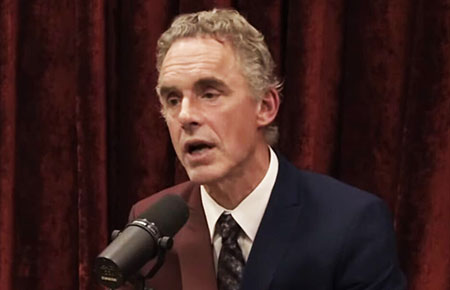by WorldTribune Staff, February 13, 2023
Jordan Peterson announced he is forming a consortium to challenge Klaus Schwab’s “apocalyptic” World Economic Forum (WEF) and its globalist aim of a “Great Reset.”
In an appearance on Joe Rogan’s podcast, Peterson said that a core idea of the consortium — which does not yet have an official name — will be to provide an “alternative vision of the future … an alternative to that kind of apocalyptic narrative that’s being put forward, at least implicitly, by organizations like the WEF.”

Peterson said the consortium wants instead to “put forward a vision that’s enticing and inviting. Imagine you can have the world you want” with “none of this Malthusian Limits to Growth nonsense.”
The Malthusian Limits to Growth is a concept based on the notion that population growth will eventually outstrip the food supply, leading to widespread famine, disease, and death.
“We get our act together,” Peterson said, “and everyone can have enough — and maybe more than enough. There is no limit to the abundance the natural world can produce.”
The consortium will discuss core ideas which include enhancing energy production and distribution, protecting individual freedoms against tyranny, and pushing back against falling birth rates with pro-family policies, Peterson told Rogan.
“You don’t get to save the planet by making energy prices so expensive that no one poor can afford them. That’s off the table,” Peterson said, adding that the development of alternative sources of energy would be welcome but “you don’t get to impose your utopian vision in the service of your narcissism on the poor. We’re going to try to make the poor rich — try to alleviate poverty.”
Analysts have criticized leftist agendas like the Green New Deal for pushing technologically immature solutions by government dictates and subsidies, making energy less reliable and more expensive, with a disproportionate impact on the poor.
Peterson said a key discussion point of the new consortium will be how to obtain “energy and resources at the lowest possible cost, as rapidly as possible, to the largest number of people around the world.”
The consortium will also look at ways to manage governance in order to “stop the march of something like pathological gigantism,” which Peterson described as growing power by a combination of corporate, governmental, and media in what he described as a kind of “corrupt collusion.”
He also said that discussions would involve exploring a “pro-human” view of stewardship: “How do we prioritize our attempts to establish our states and our international relationships properly, so that we prioritize human well-being in a way that’s in harmony with nature to the extent possible, while avoiding the trappings of the Malthusian idea that there are too many ‘mouths on the planet to feed and that you’re evil if you just think about having children.’ ”
Further, Peterson said the consortium will explore policies that would counteract falling birth rates by encouraging stable, two-parent families that are “child-centered.”
“In the West, because we’re very immature, we think that the purpose of a marriage is the happiness of the people who are involved in the marriage, the husband and the wife. And that’s just not the purpose of marriage at all,” Peterson said. “The purpose is long-term facilitation of their psychological and spiritual development and the establishment of an environment that’s beneficial to children.”
Peterson said around 2,000 business, cultural, and political figures will be invited to take part in the consortium with an initial goal of being held in October/November 2023 in London.
Peterson added that he wants the discussions to be open to the public and membership in the organization to be as broad as possible.
That would put participation at a similar scale to the WEF’s recent meeting in Davos, Switzerland, which amassed around 2,700 international leaders including heads of state, Wall Street executives, central bankers, and celebrities.
Action . . . . Intelligence . . . . Publish
